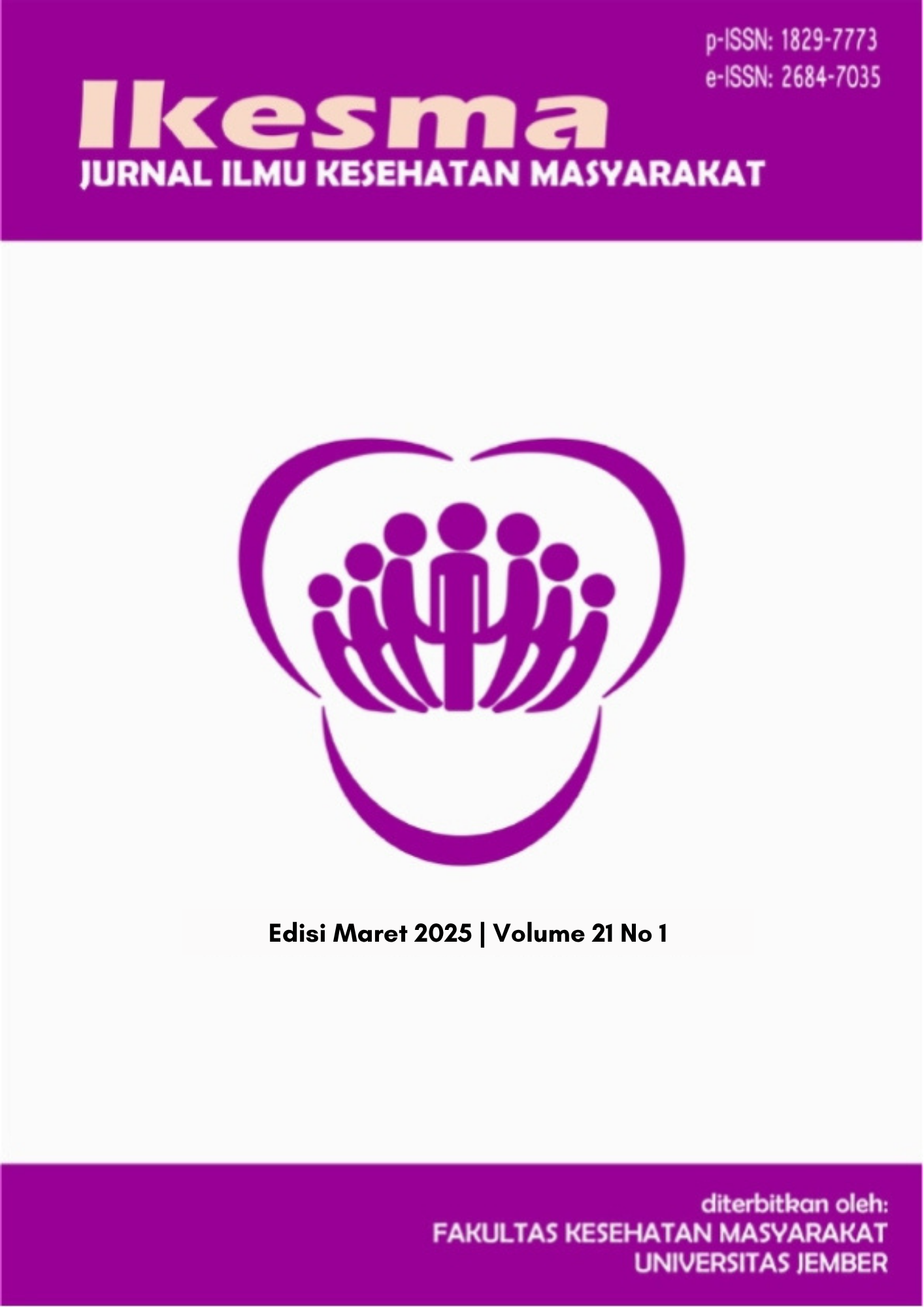KONSUMSI KOPI, HIGIENITAS TIDUR, TINGKAT KECEMASAN, DAN TINGKAT KELELAHAN SEBAGAI FAKTOR PREDIKTOR KUALITAS TIDUR MAHASISWA SARJANA FKM UNIVERSITAS INDONESIA
DOI:
https://doi.org/10.19184/ikesma.v21i1.47604Keywords:
anxiety level, coffee consumption, fatigue level, sleep hygiene, sleep qualityAbstract
Downloads
References
1] Alnawwar, M.A. et al. (2023) ‘The Effect of Physical Activity on Sleep Quality and Sleep Disorder: A Systematic Review’, Cureus [Preprint]. Available at: https://doi.org/10.7759/cureus.43595.
2] Apriliah, K.R. et al. (2022) ‘Gambaran Pola Tidur Mahasiswa Angkatan 2018’, Indonesian Journal of Health [Preprint]. Available at: http://www.citracendekiacelebes.org/index.php/INAJOH.
3] Arthy, C.C. et al. (2019) ‘Indonesian version of addiction rating scale of smartphone usage adapted from smartphone addiction scale-short version (SAS-SV) in junior high school’, Open Access Macedonian Journal of Medical Sciences, 7(19), pp. 3235–3239. Available at: https://doi.org/10.3889/oamjms.2019.691.
4] Bazaz, M.M. et al. (2023) ‘The Relationship Between Anxiety and Sleep Quality Among Medical Students’, Sleep and Vigilance, 7(2), pp. 179–185. Available at: https://doi.org/10.1007/s41782-023-00242-7.
5] Bouloukaki, I. et al. (2023) ‘Sleep Quality and Fatigue during Exam Periods in University Students: Prevalence and Associated Factors’, Healthcare (Switzerland), 11(17). Available at: https://doi.org/10.3390/healthcare11172389.
6] Buysse Charles F Reynolds Ill, D.J. et al. (1989) The Pittsburgh Sleep Quality Index: A New Instrument for Psychiatric Practice and Research, Psychiatry Research.
7] Craig, C.L. et al. (2003) ‘International physical activity questionnaire: 12-Country reliability and validity’, Medicine and Science in Sports and Exercise, 35(8), pp. 1381–1395. Available at: https://doi.org/10.1249/01.MSS.0000078924.61453.FB.
8] van Dam, R.M., Hu, F.B. and Willett, W.C. (2020) ‘Coffee, Caffeine, and Health’, New England Journal of Medicine, 383(4), pp. 369–378. Available at: https://doi.org/10.1056/nejmra1816604.
9] Drake, C. et al. (2013) ‘Caffeine effects on sleep taken 0, 3, or 6 hours before going to bed’, Journal of Clinical Sleep Medicine, 9(11), pp. 1195–1200. Available at: https://doi.org/10.5664/jcsm.3170.
10] Farhadian, N. et al. (2021) Farhadian N et al. Scandinavia Journal of Sleep Medicine Relationship of sleep hygiene related factors with sleep quality among university students: a systematic review and meta-analysis, Scandinavia Journal of Sleep Medicine|2021. Available at: https://journal.sscipub.com.
11] Howie, E.K. et al. (2020) ‘Associations between meeting sleep, physical activity or screen time behaviour guidelines and academic performance in Australian school children’, BMC Public Health, 20(1). Available at: https://doi.org/10.1186/s12889-020-08620-w.
12] Hurdawaty, R., Setiyo Wibowo, F. and Sulistiyowati, R. (2023) ‘Studying the Consumption Behaviour of Generations Y and Z towards Ready-To-Drink Coffee’, International Journal of Travel, 2.
13] Irish, L.A. et al. (2015) ‘The role of sleep hygiene in promoting public health: A review of empirical evidence’, Sleep Medicine Reviews. W.B. Saunders Ltd, pp. 23–36. Available at: https://doi.org/10.1016/j.smrv.2014.10.001.
14] Lemma, S. et al. (2012) ‘Sleep quality and its psychological correlates among university students in Ethiopia: A cross-sectional study’, BMC Psychiatry, 12. Available at: https://doi.org/10.1186/1471-244X-12-237.
15] Loftfield, E. et al. (2015) ‘Association of Coffee Consumption With Overall and Cause-Specific Mortality in a Large US Prospective Cohort Study’, American Journal of Epidemiology, 182(12), pp. 1010–1022. Available at: https://doi.org/10.1093/aje/kwv146.
16] Michielsen, H.J. et al. (2004) ‘Examination of the Dimensionality of Fatigue: The Construction of the Fatigue Assessment Scale (FAS)’, European Journal of Psychological Assessment, 20(1), pp. 39–48. Available at: https://doi.org/10.1027/1015-5759.20.1.39.
17] Nikolic, A. et al. (2023) ‘Smartphone addiction, sleep quality, depression, anxiety, and stress among medical students’, Frontiers in Public Health, 11. Available at: https://doi.org/10.3389/fpubh.2023.1252371.
18] O’callaghan, F., Muurlink, O. and Reid, N. (2018) ‘Effects of caffeine on sleep quality and daytime functioning’, Risk Management and Healthcare Policy. Dove Medical Press Ltd, pp. 263–271. Available at: https://doi.org/10.2147/RMHP.S156404.
19] Oh, C.M. et al. (2019) ‘The effect of anxiety and depression on sleep quality of individuals with high risk for insomnia: A population-based study’, Frontiers in Neurology, 10(JUL). Available at: https://doi.org/10.3389/fneur.2019.00849.
20] Olechno, E. et al. (2021) ‘Influence of various factors on caffeine content in coffee brews’, Foods, 10(6). Available at: https://doi.org/10.3390/foods10061208.
21] Peltzer, K. and Pengpid, S. (2016) ‘Sleep duration and health correlates among university students in 26 countries’, Psychology, Health and Medicine, 21(2), pp. 208–220. Available at: https://doi.org/10.1080/13548506.2014.998687.
22] Rafique, N. et al. (2020) ‘Effects of mobile use on subjective sleep quality’, Nature and Science of Sleep, 12, pp. 357–364. Available at: https://doi.org/10.2147/NSS.S253375.
23] Ramakrishnan, S. et al. (2014) ‘Dose-dependent model of caffeine effects on human vigilance during total sleep deprivation’, Journal of Theoretical Biology, 358, pp. 11–24. Available at: https://doi.org/10.1016/j.jtbi.2014.05.017.
24] Ramdan, I.M. (2018) ‘Reliability and Validity Test of the Indonesian Version of the Hamilton Anxiety Rating Scale (HAM-A) to Measure Work-related Stress in Nursing’, Jurnal Ners, 14(1). Available at: https://doi.org/10.20473/jn.v13i1.10673.
25] Rathakrishnan, B. et al. (2021) ‘Smartphone addiction and sleep quality on academic performance of university students: An exploratory research’, International Journal of Environmental Research and Public Health, 18(16). Available at: https://doi.org/10.3390/ijerph18168291.
26] Reski, N. et al. (2022) ‘THE RELATIONSHIP OF ANXIETY WITH SLEEP QUALITY OF FK UISU STUDENTS DURING THE COVID-19 PANDEMIC’, Jurnal Kedokteran STM (Sains dan Teknologi Medik), V(2). Available at: https://jurnal.fk.uisu.ac.id/index.php/stm.
27] Roshifanni, S. (2016) ‘RISIKO HIPERTENSI PADA ORANG DENGAN POLA TIDUR BURUK (Studi di Puskesmas Tanah Kalikedinding Surabaya) Risk of Hypertension in People with Poor Sleep Pattern (Study in Puskesmas Tanah Kalikedinding Surabaya)’, Jurnal Berkala Epidemiologi, 4(3), pp. 408–419. Available at: https://doi.org/10.20473/jbe.v4i3.
28] Sajadi, S.A. et al. (2016) Sleep quality and the factors affecting the fatigue severity and academic performance of students at AJA University of Medical Sciences, Journal of Advances in Medical Education (JAMED).
29] dos Santos, G.B. et al. (2022) ‘Fatigue, sleep quality and mental health symptoms in Brazilian women during the COVID-19 pandemic: longitudinal study’, Scientific Reports, 12(1). Available at: https://doi.org/10.1038/s41598-022-23612-z.
30] Staner, L. (2003) ‘DialoguesClinNeurosci-5-249’, Dialogues in Clinical Neuroscience, 5(3).
31] Syifa, E.N. (2018) Hubungan Kualitas Tidur dengan Tekanan Darah pada Mahasiswa Universitas Indonesia. Universitas Indonesia.
32] Tarokh, L., Saletin, J.M. and Carskadon, M.A. (2016) ‘Sleep in adolescence: Physiology, cognition and mental health’, Neuroscience and Biobehavioral Reviews. Elsevier Ltd, pp. 182–188. Available at: https://doi.org/10.1016/j.neubiorev.2016.08.008.
33] Wang, F. and Bíró, É. (2021) ‘Determinants of sleep quality in college students: A literature review’, Explore. Elsevier Inc., pp. 170–177. Available at: https://doi.org/10.1016/j.explore.2020.11.003.
34] Watson, N.F. et al. (2015) ‘Recommended amount of sleep for a healthy adult: A joint consensus statement of the American Academy of Sleep Medicine and Sleep Research Society’, in Sleep. Associated Professional Sleep Societies,LLC, pp. 843–844. Available at: https://doi.org/10.5665/sleep.4716.
35] Weibel, J. et al. (2021) ‘The impact of daily caffeine intake on nighttime sleep in young adult men’, Scientific Reports, 11(1). Available at: https://doi.org/10.1038/s41598-021-84088-x.
36] Yusnitasari, A.S. et al. (2022) ‘Penggunaan Gadget dengan Kejadian Insomnia pada Remaja: Cross Sectional Study pada Siswa SMA di Daerah Urban dan Rural’, Media Publikasi Promosi Kesehatan Indonesia, 5(12), pp. 1639–1645. Available at: https://doi.org/10.31934/mppki.v2i3.
37] Zagaria, A. et al. (2021) ‘Psychometric properties of the Sleep Hygiene Index in a large Italian community sample’, Sleep Medicine, 84, pp. 362–367. Available at: https://doi.org/10.1016/j.sleep.2021.06.021.
Downloads
Published
Issue
Section
License
Copyright (c) 2025 Adil Sidik, Wahyu Kurnia Yusrin Putra, Trini Sudiarti, Khoirul Anwar

This work is licensed under a Creative Commons Attribution-ShareAlike 4.0 International License.






